Analysis of Ketogenic, Atkins, Vegan, and Intermittent Fasting Diets
VerifiedAdded on 2022/12/30
|10
|3657
|85
Report
AI Summary
This report provides a comprehensive analysis of four popular diets: Ketogenic, Atkins, Intermittent Fasting, and Vegan. It begins with an introduction to each diet, highlighting their key features and health benefits. A literature review delves into the origins, principles, and scientific basis of each diet, including the role of carbohydrates, fats, and proteins. The methodology section outlines the qualitative research approach used, including structured survey questions to gather opinions on the diets' effectiveness, advantages, and disadvantages. Findings from the survey are presented, detailing respondents' views on the Ketogenic, Intermittent Fasting, and Vegan diets, including reported positive and negative effects. The report concludes with a comparative assessment of the diets, offering insights into their suitability for different individuals and health goals, and offers a better diet plan for maintaining body weight.
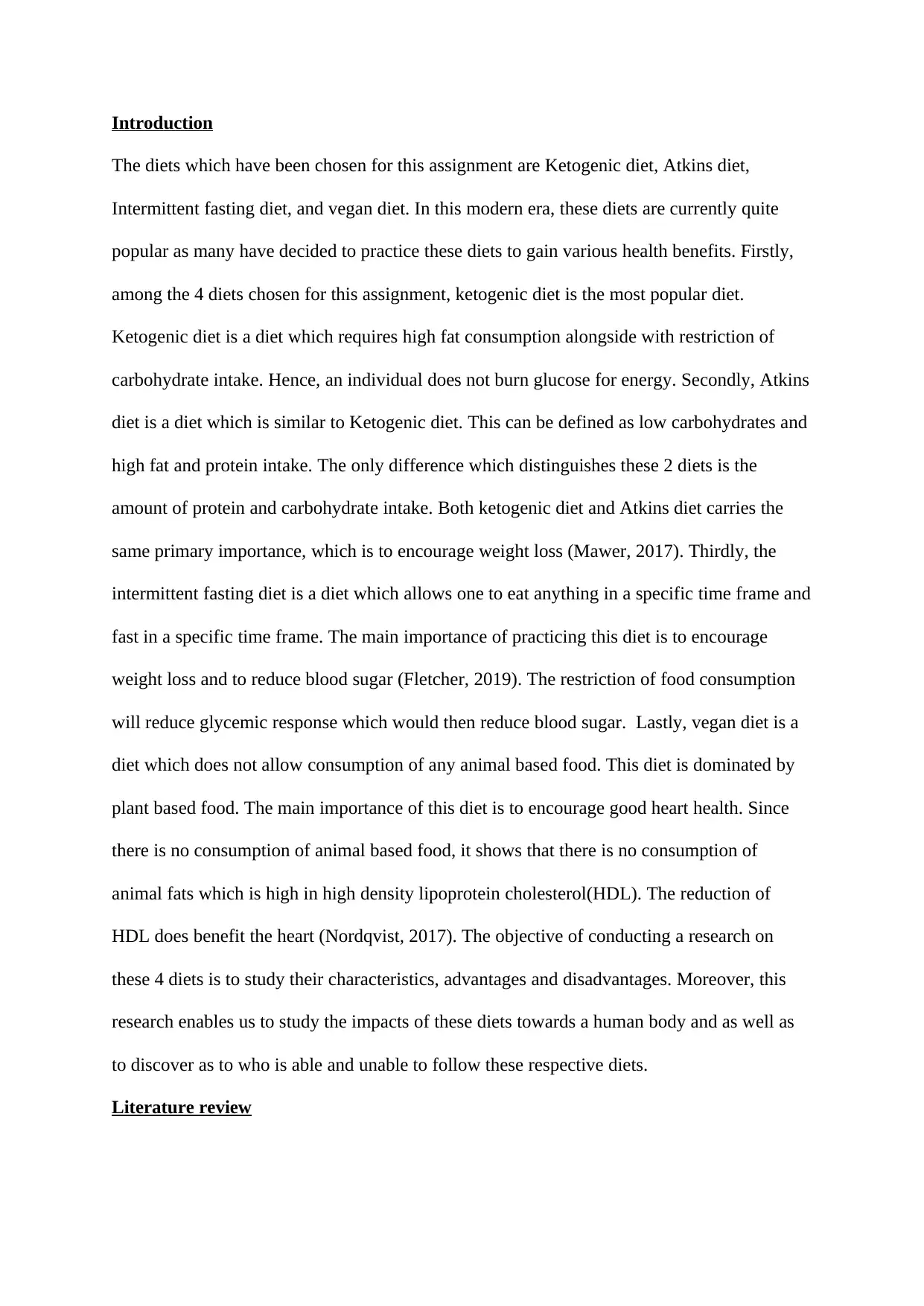
Introduction
The diets which have been chosen for this assignment are Ketogenic diet, Atkins diet,
Intermittent fasting diet, and vegan diet. In this modern era, these diets are currently quite
popular as many have decided to practice these diets to gain various health benefits. Firstly,
among the 4 diets chosen for this assignment, ketogenic diet is the most popular diet.
Ketogenic diet is a diet which requires high fat consumption alongside with restriction of
carbohydrate intake. Hence, an individual does not burn glucose for energy. Secondly, Atkins
diet is a diet which is similar to Ketogenic diet. This can be defined as low carbohydrates and
high fat and protein intake. The only difference which distinguishes these 2 diets is the
amount of protein and carbohydrate intake. Both ketogenic diet and Atkins diet carries the
same primary importance, which is to encourage weight loss (Mawer, 2017). Thirdly, the
intermittent fasting diet is a diet which allows one to eat anything in a specific time frame and
fast in a specific time frame. The main importance of practicing this diet is to encourage
weight loss and to reduce blood sugar (Fletcher, 2019). The restriction of food consumption
will reduce glycemic response which would then reduce blood sugar. Lastly, vegan diet is a
diet which does not allow consumption of any animal based food. This diet is dominated by
plant based food. The main importance of this diet is to encourage good heart health. Since
there is no consumption of animal based food, it shows that there is no consumption of
animal fats which is high in high density lipoprotein cholesterol(HDL). The reduction of
HDL does benefit the heart (Nordqvist, 2017). The objective of conducting a research on
these 4 diets is to study their characteristics, advantages and disadvantages. Moreover, this
research enables us to study the impacts of these diets towards a human body and as well as
to discover as to who is able and unable to follow these respective diets.
Literature review
The diets which have been chosen for this assignment are Ketogenic diet, Atkins diet,
Intermittent fasting diet, and vegan diet. In this modern era, these diets are currently quite
popular as many have decided to practice these diets to gain various health benefits. Firstly,
among the 4 diets chosen for this assignment, ketogenic diet is the most popular diet.
Ketogenic diet is a diet which requires high fat consumption alongside with restriction of
carbohydrate intake. Hence, an individual does not burn glucose for energy. Secondly, Atkins
diet is a diet which is similar to Ketogenic diet. This can be defined as low carbohydrates and
high fat and protein intake. The only difference which distinguishes these 2 diets is the
amount of protein and carbohydrate intake. Both ketogenic diet and Atkins diet carries the
same primary importance, which is to encourage weight loss (Mawer, 2017). Thirdly, the
intermittent fasting diet is a diet which allows one to eat anything in a specific time frame and
fast in a specific time frame. The main importance of practicing this diet is to encourage
weight loss and to reduce blood sugar (Fletcher, 2019). The restriction of food consumption
will reduce glycemic response which would then reduce blood sugar. Lastly, vegan diet is a
diet which does not allow consumption of any animal based food. This diet is dominated by
plant based food. The main importance of this diet is to encourage good heart health. Since
there is no consumption of animal based food, it shows that there is no consumption of
animal fats which is high in high density lipoprotein cholesterol(HDL). The reduction of
HDL does benefit the heart (Nordqvist, 2017). The objective of conducting a research on
these 4 diets is to study their characteristics, advantages and disadvantages. Moreover, this
research enables us to study the impacts of these diets towards a human body and as well as
to discover as to who is able and unable to follow these respective diets.
Literature review
Paraphrase This Document
Need a fresh take? Get an instant paraphrase of this document with our AI Paraphraser
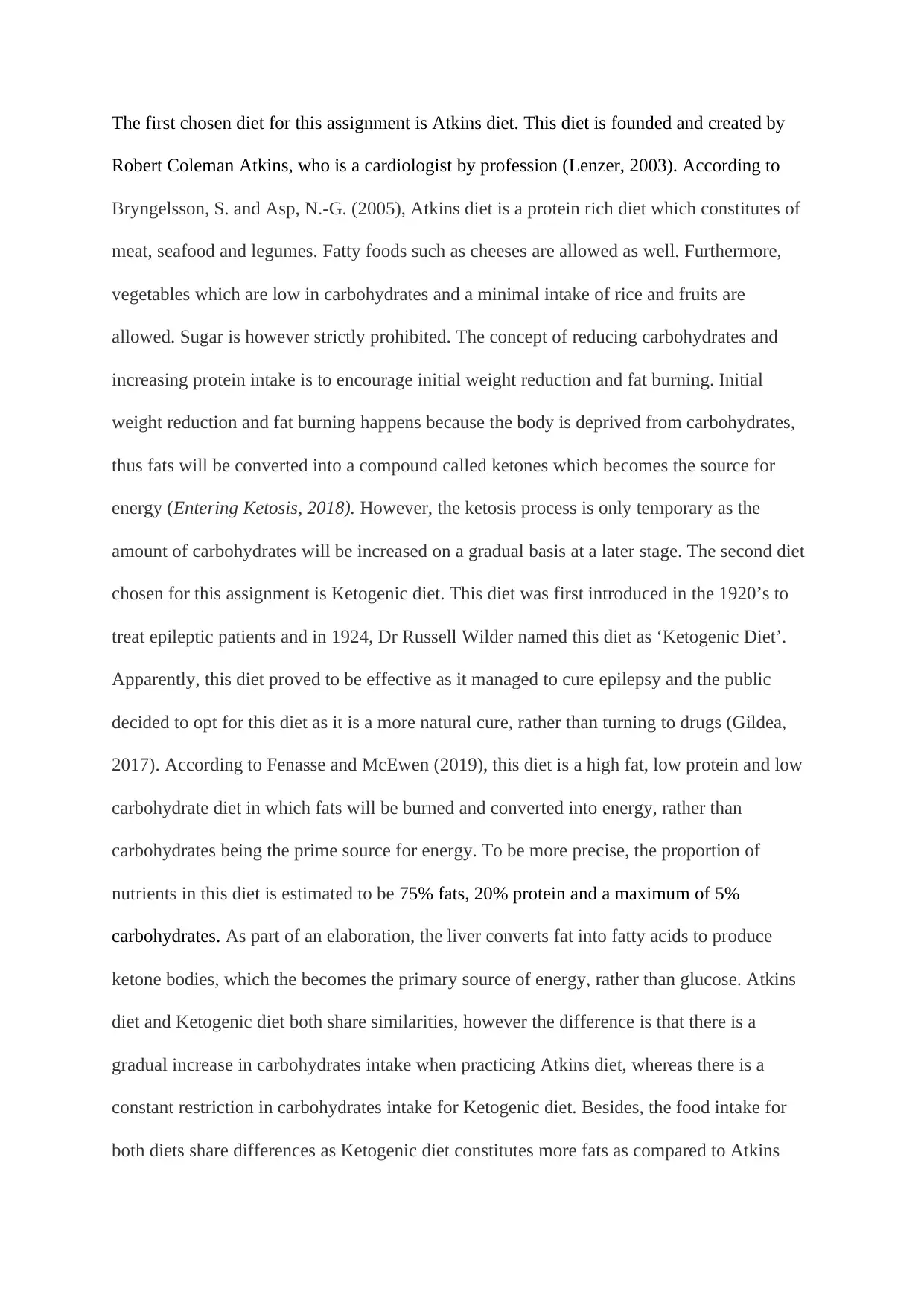
The first chosen diet for this assignment is Atkins diet. This diet is founded and created by
Robert Coleman Atkins, who is a cardiologist by profession (Lenzer, 2003). According to
Bryngelsson, S. and Asp, N.-G. (2005), Atkins diet is a protein rich diet which constitutes of
meat, seafood and legumes. Fatty foods such as cheeses are allowed as well. Furthermore,
vegetables which are low in carbohydrates and a minimal intake of rice and fruits are
allowed. Sugar is however strictly prohibited. The concept of reducing carbohydrates and
increasing protein intake is to encourage initial weight reduction and fat burning. Initial
weight reduction and fat burning happens because the body is deprived from carbohydrates,
thus fats will be converted into a compound called ketones which becomes the source for
energy (Entering Ketosis, 2018). However, the ketosis process is only temporary as the
amount of carbohydrates will be increased on a gradual basis at a later stage. The second diet
chosen for this assignment is Ketogenic diet. This diet was first introduced in the 1920’s to
treat epileptic patients and in 1924, Dr Russell Wilder named this diet as ‘Ketogenic Diet’.
Apparently, this diet proved to be effective as it managed to cure epilepsy and the public
decided to opt for this diet as it is a more natural cure, rather than turning to drugs (Gildea,
2017). According to Fenasse and McEwen (2019), this diet is a high fat, low protein and low
carbohydrate diet in which fats will be burned and converted into energy, rather than
carbohydrates being the prime source for energy. To be more precise, the proportion of
nutrients in this diet is estimated to be 75% fats, 20% protein and a maximum of 5%
carbohydrates. As part of an elaboration, the liver converts fat into fatty acids to produce
ketone bodies, which the becomes the primary source of energy, rather than glucose. Atkins
diet and Ketogenic diet both share similarities, however the difference is that there is a
gradual increase in carbohydrates intake when practicing Atkins diet, whereas there is a
constant restriction in carbohydrates intake for Ketogenic diet. Besides, the food intake for
both diets share differences as Ketogenic diet constitutes more fats as compared to Atkins
Robert Coleman Atkins, who is a cardiologist by profession (Lenzer, 2003). According to
Bryngelsson, S. and Asp, N.-G. (2005), Atkins diet is a protein rich diet which constitutes of
meat, seafood and legumes. Fatty foods such as cheeses are allowed as well. Furthermore,
vegetables which are low in carbohydrates and a minimal intake of rice and fruits are
allowed. Sugar is however strictly prohibited. The concept of reducing carbohydrates and
increasing protein intake is to encourage initial weight reduction and fat burning. Initial
weight reduction and fat burning happens because the body is deprived from carbohydrates,
thus fats will be converted into a compound called ketones which becomes the source for
energy (Entering Ketosis, 2018). However, the ketosis process is only temporary as the
amount of carbohydrates will be increased on a gradual basis at a later stage. The second diet
chosen for this assignment is Ketogenic diet. This diet was first introduced in the 1920’s to
treat epileptic patients and in 1924, Dr Russell Wilder named this diet as ‘Ketogenic Diet’.
Apparently, this diet proved to be effective as it managed to cure epilepsy and the public
decided to opt for this diet as it is a more natural cure, rather than turning to drugs (Gildea,
2017). According to Fenasse and McEwen (2019), this diet is a high fat, low protein and low
carbohydrate diet in which fats will be burned and converted into energy, rather than
carbohydrates being the prime source for energy. To be more precise, the proportion of
nutrients in this diet is estimated to be 75% fats, 20% protein and a maximum of 5%
carbohydrates. As part of an elaboration, the liver converts fat into fatty acids to produce
ketone bodies, which the becomes the primary source of energy, rather than glucose. Atkins
diet and Ketogenic diet both share similarities, however the difference is that there is a
gradual increase in carbohydrates intake when practicing Atkins diet, whereas there is a
constant restriction in carbohydrates intake for Ketogenic diet. Besides, the food intake for
both diets share differences as Ketogenic diet constitutes more fats as compared to Atkins
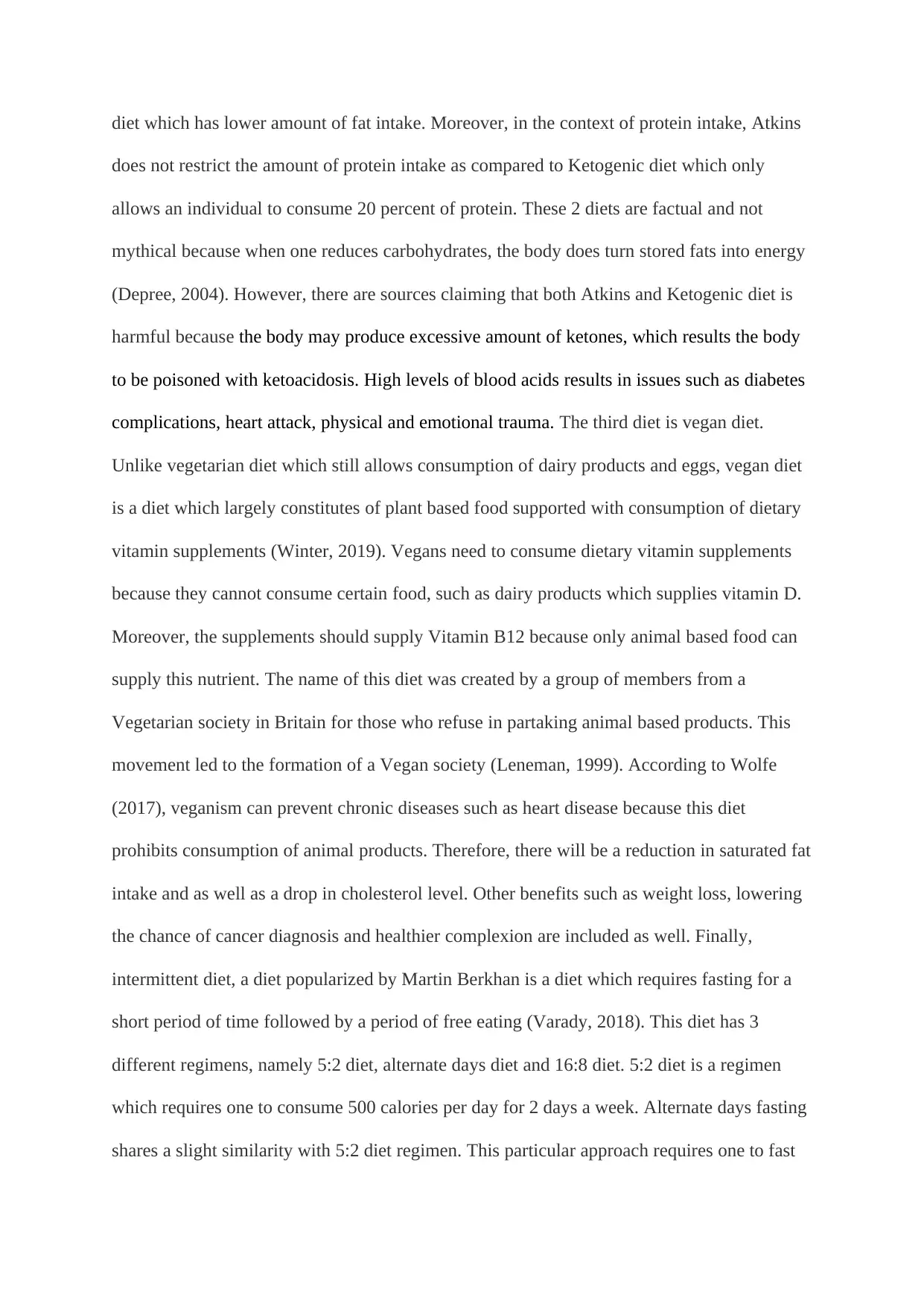
diet which has lower amount of fat intake. Moreover, in the context of protein intake, Atkins
does not restrict the amount of protein intake as compared to Ketogenic diet which only
allows an individual to consume 20 percent of protein. These 2 diets are factual and not
mythical because when one reduces carbohydrates, the body does turn stored fats into energy
(Depree, 2004). However, there are sources claiming that both Atkins and Ketogenic diet is
harmful because the body may produce excessive amount of ketones, which results the body
to be poisoned with ketoacidosis. High levels of blood acids results in issues such as diabetes
complications, heart attack, physical and emotional trauma. The third diet is vegan diet.
Unlike vegetarian diet which still allows consumption of dairy products and eggs, vegan diet
is a diet which largely constitutes of plant based food supported with consumption of dietary
vitamin supplements (Winter, 2019). Vegans need to consume dietary vitamin supplements
because they cannot consume certain food, such as dairy products which supplies vitamin D.
Moreover, the supplements should supply Vitamin B12 because only animal based food can
supply this nutrient. The name of this diet was created by a group of members from a
Vegetarian society in Britain for those who refuse in partaking animal based products. This
movement led to the formation of a Vegan society (Leneman, 1999). According to Wolfe
(2017), veganism can prevent chronic diseases such as heart disease because this diet
prohibits consumption of animal products. Therefore, there will be a reduction in saturated fat
intake and as well as a drop in cholesterol level. Other benefits such as weight loss, lowering
the chance of cancer diagnosis and healthier complexion are included as well. Finally,
intermittent diet, a diet popularized by Martin Berkhan is a diet which requires fasting for a
short period of time followed by a period of free eating (Varady, 2018). This diet has 3
different regimens, namely 5:2 diet, alternate days diet and 16:8 diet. 5:2 diet is a regimen
which requires one to consume 500 calories per day for 2 days a week. Alternate days fasting
shares a slight similarity with 5:2 diet regimen. This particular approach requires one to fast
does not restrict the amount of protein intake as compared to Ketogenic diet which only
allows an individual to consume 20 percent of protein. These 2 diets are factual and not
mythical because when one reduces carbohydrates, the body does turn stored fats into energy
(Depree, 2004). However, there are sources claiming that both Atkins and Ketogenic diet is
harmful because the body may produce excessive amount of ketones, which results the body
to be poisoned with ketoacidosis. High levels of blood acids results in issues such as diabetes
complications, heart attack, physical and emotional trauma. The third diet is vegan diet.
Unlike vegetarian diet which still allows consumption of dairy products and eggs, vegan diet
is a diet which largely constitutes of plant based food supported with consumption of dietary
vitamin supplements (Winter, 2019). Vegans need to consume dietary vitamin supplements
because they cannot consume certain food, such as dairy products which supplies vitamin D.
Moreover, the supplements should supply Vitamin B12 because only animal based food can
supply this nutrient. The name of this diet was created by a group of members from a
Vegetarian society in Britain for those who refuse in partaking animal based products. This
movement led to the formation of a Vegan society (Leneman, 1999). According to Wolfe
(2017), veganism can prevent chronic diseases such as heart disease because this diet
prohibits consumption of animal products. Therefore, there will be a reduction in saturated fat
intake and as well as a drop in cholesterol level. Other benefits such as weight loss, lowering
the chance of cancer diagnosis and healthier complexion are included as well. Finally,
intermittent diet, a diet popularized by Martin Berkhan is a diet which requires fasting for a
short period of time followed by a period of free eating (Varady, 2018). This diet has 3
different regimens, namely 5:2 diet, alternate days diet and 16:8 diet. 5:2 diet is a regimen
which requires one to consume 500 calories per day for 2 days a week. Alternate days fasting
shares a slight similarity with 5:2 diet regimen. This particular approach requires one to fast
⊘ This is a preview!⊘
Do you want full access?
Subscribe today to unlock all pages.

Trusted by 1+ million students worldwide
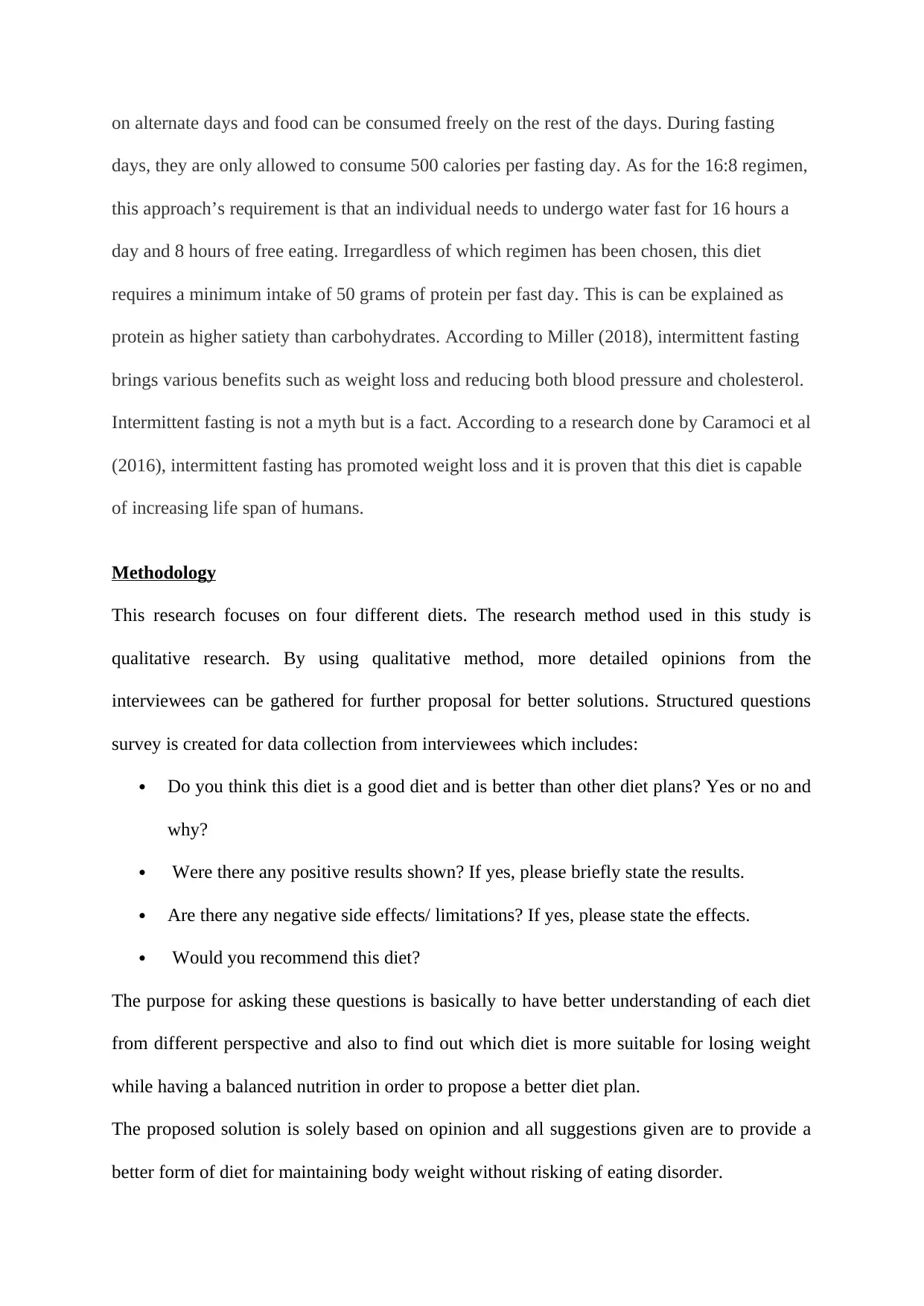
on alternate days and food can be consumed freely on the rest of the days. During fasting
days, they are only allowed to consume 500 calories per fasting day. As for the 16:8 regimen,
this approach’s requirement is that an individual needs to undergo water fast for 16 hours a
day and 8 hours of free eating. Irregardless of which regimen has been chosen, this diet
requires a minimum intake of 50 grams of protein per fast day. This is can be explained as
protein as higher satiety than carbohydrates. According to Miller (2018), intermittent fasting
brings various benefits such as weight loss and reducing both blood pressure and cholesterol.
Intermittent fasting is not a myth but is a fact. According to a research done by Caramoci et al
(2016), intermittent fasting has promoted weight loss and it is proven that this diet is capable
of increasing life span of humans.
Methodology
This research focuses on four different diets. The research method used in this study is
qualitative research. By using qualitative method, more detailed opinions from the
interviewees can be gathered for further proposal for better solutions. Structured questions
survey is created for data collection from interviewees which includes:
Do you think this diet is a good diet and is better than other diet plans? Yes or no and
why?
Were there any positive results shown? If yes, please briefly state the results.
Are there any negative side effects/ limitations? If yes, please state the effects.
Would you recommend this diet?
The purpose for asking these questions is basically to have better understanding of each diet
from different perspective and also to find out which diet is more suitable for losing weight
while having a balanced nutrition in order to propose a better diet plan.
The proposed solution is solely based on opinion and all suggestions given are to provide a
better form of diet for maintaining body weight without risking of eating disorder.
days, they are only allowed to consume 500 calories per fasting day. As for the 16:8 regimen,
this approach’s requirement is that an individual needs to undergo water fast for 16 hours a
day and 8 hours of free eating. Irregardless of which regimen has been chosen, this diet
requires a minimum intake of 50 grams of protein per fast day. This is can be explained as
protein as higher satiety than carbohydrates. According to Miller (2018), intermittent fasting
brings various benefits such as weight loss and reducing both blood pressure and cholesterol.
Intermittent fasting is not a myth but is a fact. According to a research done by Caramoci et al
(2016), intermittent fasting has promoted weight loss and it is proven that this diet is capable
of increasing life span of humans.
Methodology
This research focuses on four different diets. The research method used in this study is
qualitative research. By using qualitative method, more detailed opinions from the
interviewees can be gathered for further proposal for better solutions. Structured questions
survey is created for data collection from interviewees which includes:
Do you think this diet is a good diet and is better than other diet plans? Yes or no and
why?
Were there any positive results shown? If yes, please briefly state the results.
Are there any negative side effects/ limitations? If yes, please state the effects.
Would you recommend this diet?
The purpose for asking these questions is basically to have better understanding of each diet
from different perspective and also to find out which diet is more suitable for losing weight
while having a balanced nutrition in order to propose a better diet plan.
The proposed solution is solely based on opinion and all suggestions given are to provide a
better form of diet for maintaining body weight without risking of eating disorder.
Paraphrase This Document
Need a fresh take? Get an instant paraphrase of this document with our AI Paraphraser
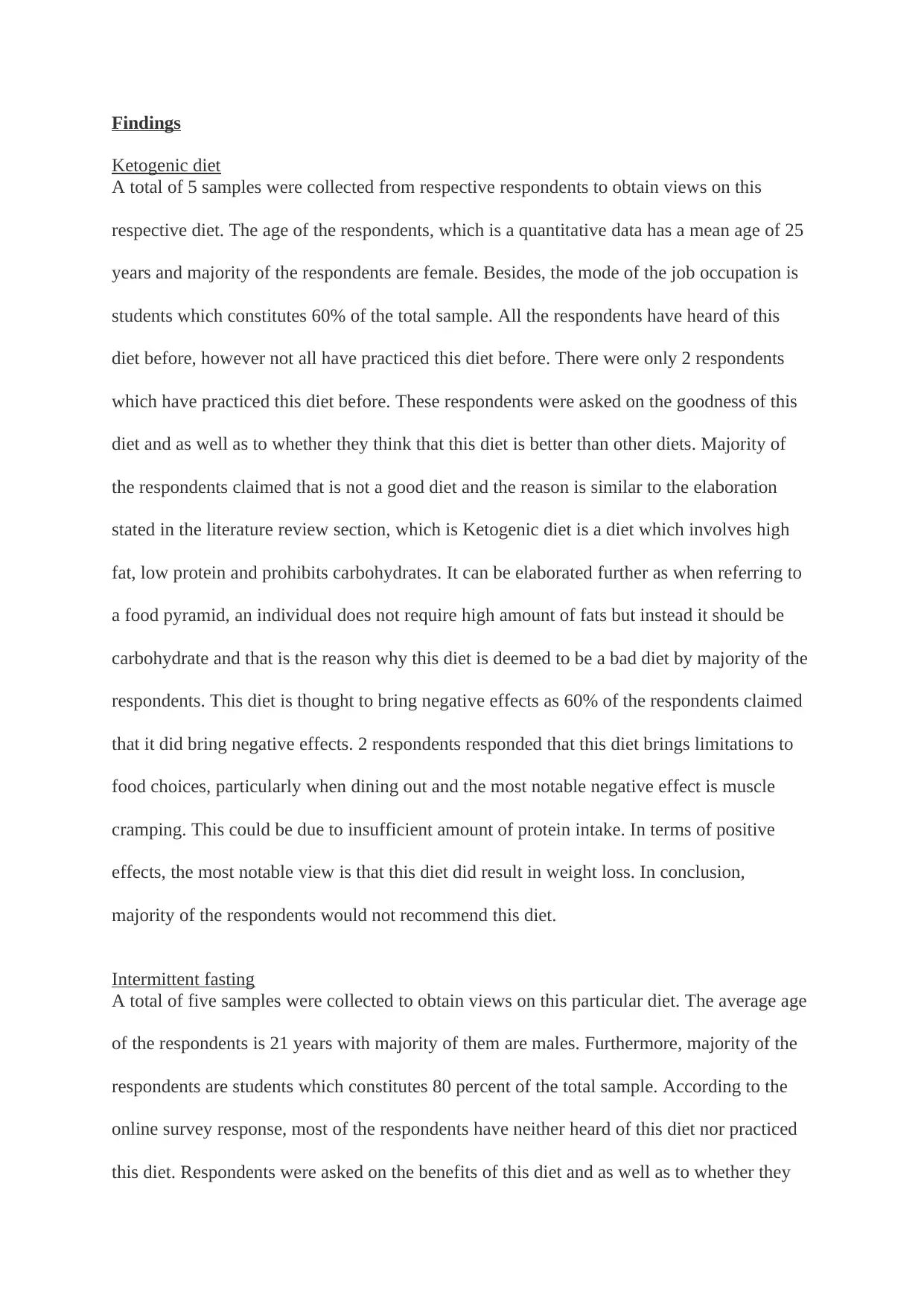
Findings
Ketogenic diet
A total of 5 samples were collected from respective respondents to obtain views on this
respective diet. The age of the respondents, which is a quantitative data has a mean age of 25
years and majority of the respondents are female. Besides, the mode of the job occupation is
students which constitutes 60% of the total sample. All the respondents have heard of this
diet before, however not all have practiced this diet before. There were only 2 respondents
which have practiced this diet before. These respondents were asked on the goodness of this
diet and as well as to whether they think that this diet is better than other diets. Majority of
the respondents claimed that is not a good diet and the reason is similar to the elaboration
stated in the literature review section, which is Ketogenic diet is a diet which involves high
fat, low protein and prohibits carbohydrates. It can be elaborated further as when referring to
a food pyramid, an individual does not require high amount of fats but instead it should be
carbohydrate and that is the reason why this diet is deemed to be a bad diet by majority of the
respondents. This diet is thought to bring negative effects as 60% of the respondents claimed
that it did bring negative effects. 2 respondents responded that this diet brings limitations to
food choices, particularly when dining out and the most notable negative effect is muscle
cramping. This could be due to insufficient amount of protein intake. In terms of positive
effects, the most notable view is that this diet did result in weight loss. In conclusion,
majority of the respondents would not recommend this diet.
Intermittent fasting
A total of five samples were collected to obtain views on this particular diet. The average age
of the respondents is 21 years with majority of them are males. Furthermore, majority of the
respondents are students which constitutes 80 percent of the total sample. According to the
online survey response, most of the respondents have neither heard of this diet nor practiced
this diet. Respondents were asked on the benefits of this diet and as well as to whether they
Ketogenic diet
A total of 5 samples were collected from respective respondents to obtain views on this
respective diet. The age of the respondents, which is a quantitative data has a mean age of 25
years and majority of the respondents are female. Besides, the mode of the job occupation is
students which constitutes 60% of the total sample. All the respondents have heard of this
diet before, however not all have practiced this diet before. There were only 2 respondents
which have practiced this diet before. These respondents were asked on the goodness of this
diet and as well as to whether they think that this diet is better than other diets. Majority of
the respondents claimed that is not a good diet and the reason is similar to the elaboration
stated in the literature review section, which is Ketogenic diet is a diet which involves high
fat, low protein and prohibits carbohydrates. It can be elaborated further as when referring to
a food pyramid, an individual does not require high amount of fats but instead it should be
carbohydrate and that is the reason why this diet is deemed to be a bad diet by majority of the
respondents. This diet is thought to bring negative effects as 60% of the respondents claimed
that it did bring negative effects. 2 respondents responded that this diet brings limitations to
food choices, particularly when dining out and the most notable negative effect is muscle
cramping. This could be due to insufficient amount of protein intake. In terms of positive
effects, the most notable view is that this diet did result in weight loss. In conclusion,
majority of the respondents would not recommend this diet.
Intermittent fasting
A total of five samples were collected to obtain views on this particular diet. The average age
of the respondents is 21 years with majority of them are males. Furthermore, majority of the
respondents are students which constitutes 80 percent of the total sample. According to the
online survey response, most of the respondents have neither heard of this diet nor practiced
this diet. Respondents were asked on the benefits of this diet and as well as to whether they
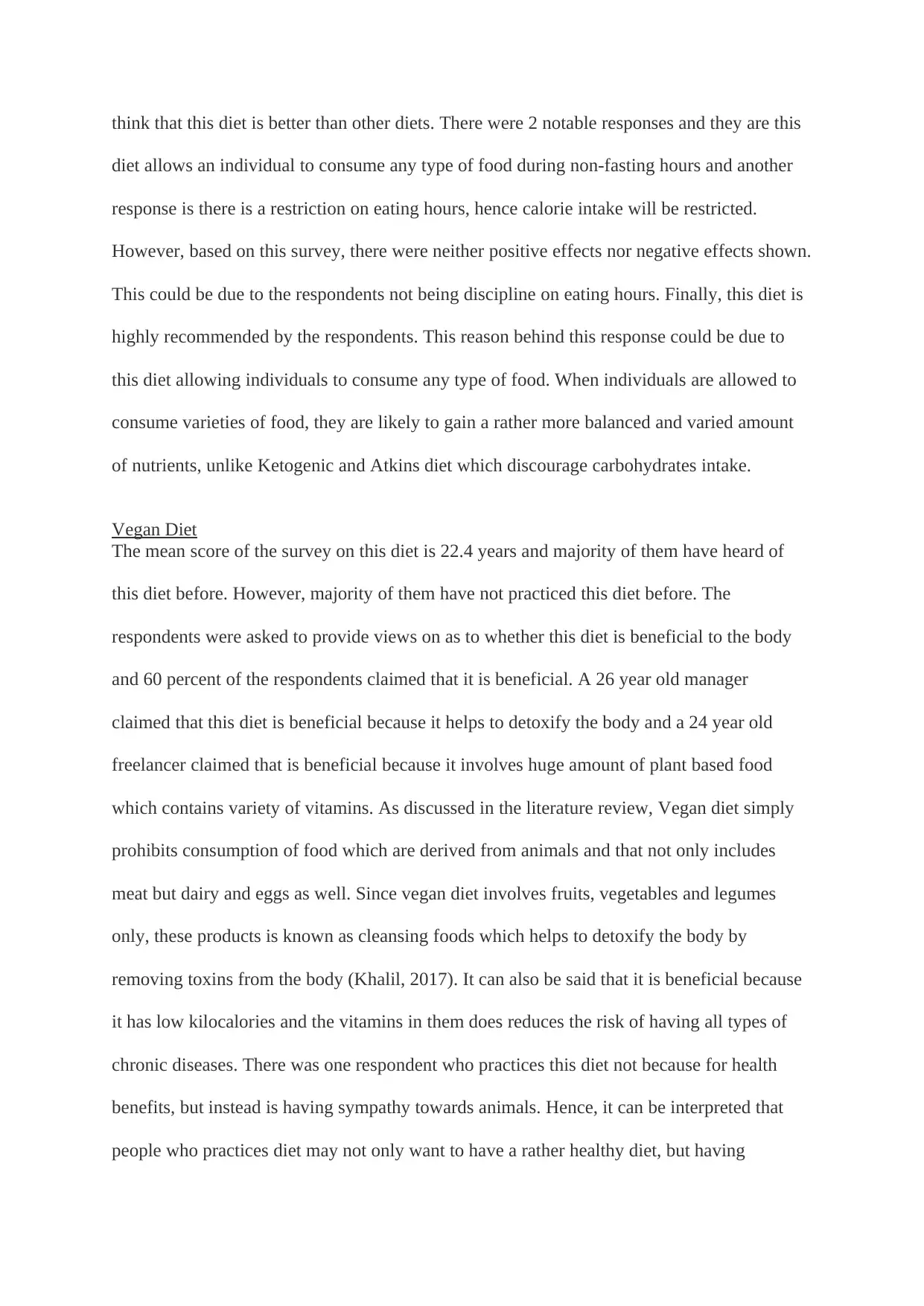
think that this diet is better than other diets. There were 2 notable responses and they are this
diet allows an individual to consume any type of food during non-fasting hours and another
response is there is a restriction on eating hours, hence calorie intake will be restricted.
However, based on this survey, there were neither positive effects nor negative effects shown.
This could be due to the respondents not being discipline on eating hours. Finally, this diet is
highly recommended by the respondents. This reason behind this response could be due to
this diet allowing individuals to consume any type of food. When individuals are allowed to
consume varieties of food, they are likely to gain a rather more balanced and varied amount
of nutrients, unlike Ketogenic and Atkins diet which discourage carbohydrates intake.
Vegan Diet
The mean score of the survey on this diet is 22.4 years and majority of them have heard of
this diet before. However, majority of them have not practiced this diet before. The
respondents were asked to provide views on as to whether this diet is beneficial to the body
and 60 percent of the respondents claimed that it is beneficial. A 26 year old manager
claimed that this diet is beneficial because it helps to detoxify the body and a 24 year old
freelancer claimed that is beneficial because it involves huge amount of plant based food
which contains variety of vitamins. As discussed in the literature review, Vegan diet simply
prohibits consumption of food which are derived from animals and that not only includes
meat but dairy and eggs as well. Since vegan diet involves fruits, vegetables and legumes
only, these products is known as cleansing foods which helps to detoxify the body by
removing toxins from the body (Khalil, 2017). It can also be said that it is beneficial because
it has low kilocalories and the vitamins in them does reduces the risk of having all types of
chronic diseases. There was one respondent who practices this diet not because for health
benefits, but instead is having sympathy towards animals. Hence, it can be interpreted that
people who practices diet may not only want to have a rather healthy diet, but having
diet allows an individual to consume any type of food during non-fasting hours and another
response is there is a restriction on eating hours, hence calorie intake will be restricted.
However, based on this survey, there were neither positive effects nor negative effects shown.
This could be due to the respondents not being discipline on eating hours. Finally, this diet is
highly recommended by the respondents. This reason behind this response could be due to
this diet allowing individuals to consume any type of food. When individuals are allowed to
consume varieties of food, they are likely to gain a rather more balanced and varied amount
of nutrients, unlike Ketogenic and Atkins diet which discourage carbohydrates intake.
Vegan Diet
The mean score of the survey on this diet is 22.4 years and majority of them have heard of
this diet before. However, majority of them have not practiced this diet before. The
respondents were asked to provide views on as to whether this diet is beneficial to the body
and 60 percent of the respondents claimed that it is beneficial. A 26 year old manager
claimed that this diet is beneficial because it helps to detoxify the body and a 24 year old
freelancer claimed that is beneficial because it involves huge amount of plant based food
which contains variety of vitamins. As discussed in the literature review, Vegan diet simply
prohibits consumption of food which are derived from animals and that not only includes
meat but dairy and eggs as well. Since vegan diet involves fruits, vegetables and legumes
only, these products is known as cleansing foods which helps to detoxify the body by
removing toxins from the body (Khalil, 2017). It can also be said that it is beneficial because
it has low kilocalories and the vitamins in them does reduces the risk of having all types of
chronic diseases. There was one respondent who practices this diet not because for health
benefits, but instead is having sympathy towards animals. Hence, it can be interpreted that
people who practices diet may not only want to have a rather healthy diet, but having
⊘ This is a preview!⊘
Do you want full access?
Subscribe today to unlock all pages.

Trusted by 1+ million students worldwide
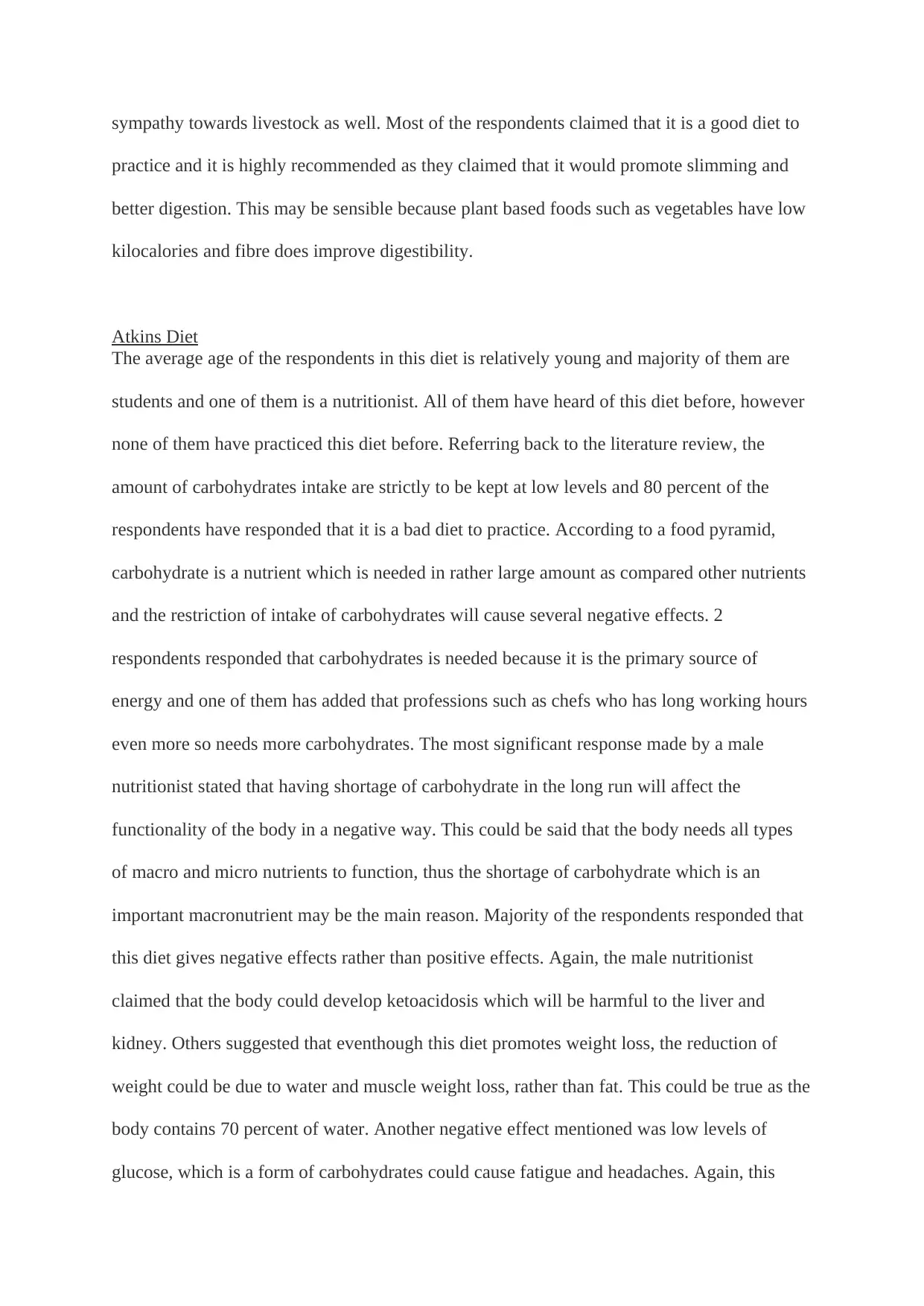
sympathy towards livestock as well. Most of the respondents claimed that it is a good diet to
practice and it is highly recommended as they claimed that it would promote slimming and
better digestion. This may be sensible because plant based foods such as vegetables have low
kilocalories and fibre does improve digestibility.
Atkins Diet
The average age of the respondents in this diet is relatively young and majority of them are
students and one of them is a nutritionist. All of them have heard of this diet before, however
none of them have practiced this diet before. Referring back to the literature review, the
amount of carbohydrates intake are strictly to be kept at low levels and 80 percent of the
respondents have responded that it is a bad diet to practice. According to a food pyramid,
carbohydrate is a nutrient which is needed in rather large amount as compared other nutrients
and the restriction of intake of carbohydrates will cause several negative effects. 2
respondents responded that carbohydrates is needed because it is the primary source of
energy and one of them has added that professions such as chefs who has long working hours
even more so needs more carbohydrates. The most significant response made by a male
nutritionist stated that having shortage of carbohydrate in the long run will affect the
functionality of the body in a negative way. This could be said that the body needs all types
of macro and micro nutrients to function, thus the shortage of carbohydrate which is an
important macronutrient may be the main reason. Majority of the respondents responded that
this diet gives negative effects rather than positive effects. Again, the male nutritionist
claimed that the body could develop ketoacidosis which will be harmful to the liver and
kidney. Others suggested that eventhough this diet promotes weight loss, the reduction of
weight could be due to water and muscle weight loss, rather than fat. This could be true as the
body contains 70 percent of water. Another negative effect mentioned was low levels of
glucose, which is a form of carbohydrates could cause fatigue and headaches. Again, this
practice and it is highly recommended as they claimed that it would promote slimming and
better digestion. This may be sensible because plant based foods such as vegetables have low
kilocalories and fibre does improve digestibility.
Atkins Diet
The average age of the respondents in this diet is relatively young and majority of them are
students and one of them is a nutritionist. All of them have heard of this diet before, however
none of them have practiced this diet before. Referring back to the literature review, the
amount of carbohydrates intake are strictly to be kept at low levels and 80 percent of the
respondents have responded that it is a bad diet to practice. According to a food pyramid,
carbohydrate is a nutrient which is needed in rather large amount as compared other nutrients
and the restriction of intake of carbohydrates will cause several negative effects. 2
respondents responded that carbohydrates is needed because it is the primary source of
energy and one of them has added that professions such as chefs who has long working hours
even more so needs more carbohydrates. The most significant response made by a male
nutritionist stated that having shortage of carbohydrate in the long run will affect the
functionality of the body in a negative way. This could be said that the body needs all types
of macro and micro nutrients to function, thus the shortage of carbohydrate which is an
important macronutrient may be the main reason. Majority of the respondents responded that
this diet gives negative effects rather than positive effects. Again, the male nutritionist
claimed that the body could develop ketoacidosis which will be harmful to the liver and
kidney. Others suggested that eventhough this diet promotes weight loss, the reduction of
weight could be due to water and muscle weight loss, rather than fat. This could be true as the
body contains 70 percent of water. Another negative effect mentioned was low levels of
glucose, which is a form of carbohydrates could cause fatigue and headaches. Again, this
Paraphrase This Document
Need a fresh take? Get an instant paraphrase of this document with our AI Paraphraser
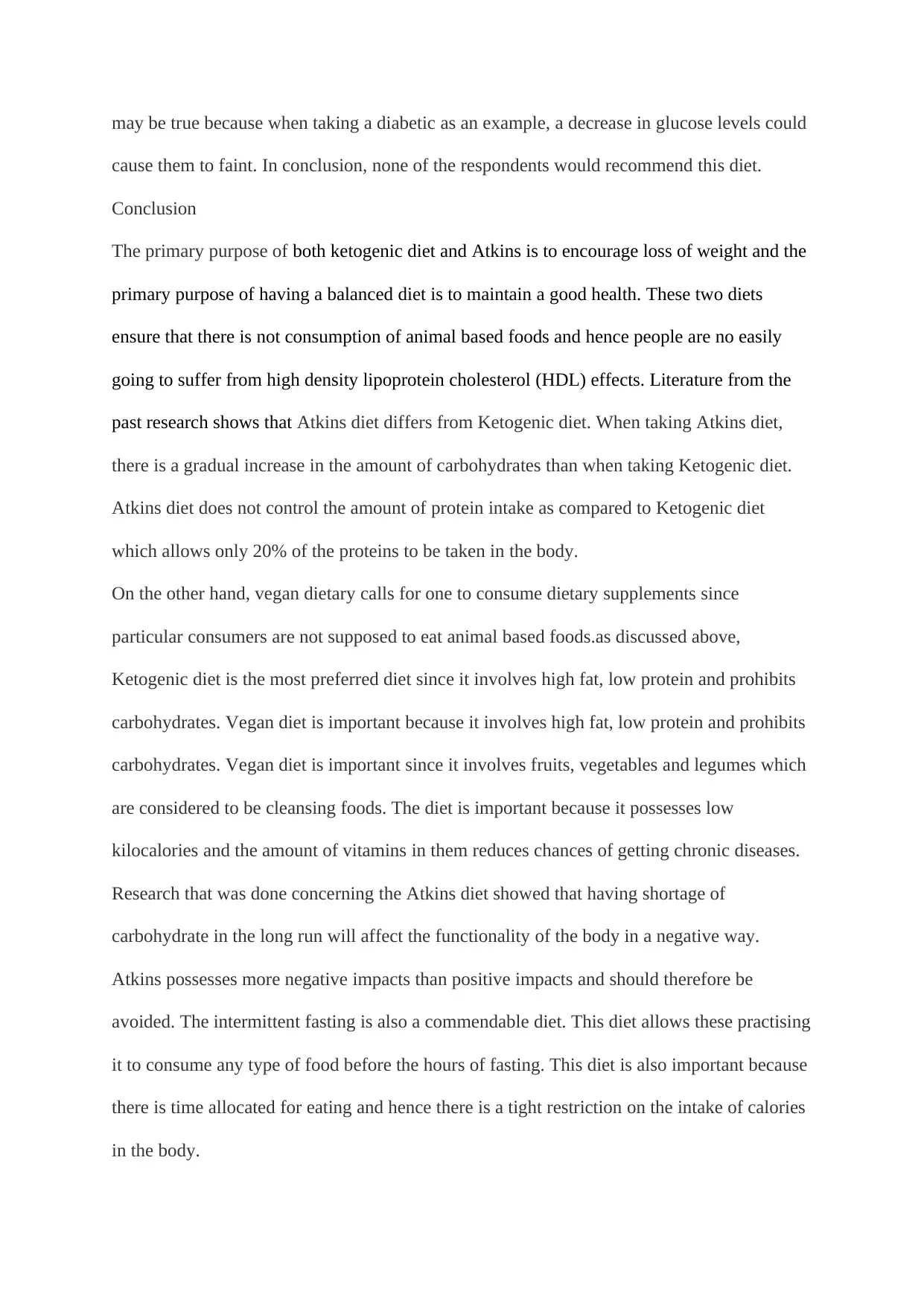
may be true because when taking a diabetic as an example, a decrease in glucose levels could
cause them to faint. In conclusion, none of the respondents would recommend this diet.
Conclusion
The primary purpose of both ketogenic diet and Atkins is to encourage loss of weight and the
primary purpose of having a balanced diet is to maintain a good health. These two diets
ensure that there is not consumption of animal based foods and hence people are no easily
going to suffer from high density lipoprotein cholesterol (HDL) effects. Literature from the
past research shows that Atkins diet differs from Ketogenic diet. When taking Atkins diet,
there is a gradual increase in the amount of carbohydrates than when taking Ketogenic diet.
Atkins diet does not control the amount of protein intake as compared to Ketogenic diet
which allows only 20% of the proteins to be taken in the body.
On the other hand, vegan dietary calls for one to consume dietary supplements since
particular consumers are not supposed to eat animal based foods.as discussed above,
Ketogenic diet is the most preferred diet since it involves high fat, low protein and prohibits
carbohydrates. Vegan diet is important because it involves high fat, low protein and prohibits
carbohydrates. Vegan diet is important since it involves fruits, vegetables and legumes which
are considered to be cleansing foods. The diet is important because it possesses low
kilocalories and the amount of vitamins in them reduces chances of getting chronic diseases.
Research that was done concerning the Atkins diet showed that having shortage of
carbohydrate in the long run will affect the functionality of the body in a negative way.
Atkins possesses more negative impacts than positive impacts and should therefore be
avoided. The intermittent fasting is also a commendable diet. This diet allows these practising
it to consume any type of food before the hours of fasting. This diet is also important because
there is time allocated for eating and hence there is a tight restriction on the intake of calories
in the body.
cause them to faint. In conclusion, none of the respondents would recommend this diet.
Conclusion
The primary purpose of both ketogenic diet and Atkins is to encourage loss of weight and the
primary purpose of having a balanced diet is to maintain a good health. These two diets
ensure that there is not consumption of animal based foods and hence people are no easily
going to suffer from high density lipoprotein cholesterol (HDL) effects. Literature from the
past research shows that Atkins diet differs from Ketogenic diet. When taking Atkins diet,
there is a gradual increase in the amount of carbohydrates than when taking Ketogenic diet.
Atkins diet does not control the amount of protein intake as compared to Ketogenic diet
which allows only 20% of the proteins to be taken in the body.
On the other hand, vegan dietary calls for one to consume dietary supplements since
particular consumers are not supposed to eat animal based foods.as discussed above,
Ketogenic diet is the most preferred diet since it involves high fat, low protein and prohibits
carbohydrates. Vegan diet is important because it involves high fat, low protein and prohibits
carbohydrates. Vegan diet is important since it involves fruits, vegetables and legumes which
are considered to be cleansing foods. The diet is important because it possesses low
kilocalories and the amount of vitamins in them reduces chances of getting chronic diseases.
Research that was done concerning the Atkins diet showed that having shortage of
carbohydrate in the long run will affect the functionality of the body in a negative way.
Atkins possesses more negative impacts than positive impacts and should therefore be
avoided. The intermittent fasting is also a commendable diet. This diet allows these practising
it to consume any type of food before the hours of fasting. This diet is also important because
there is time allocated for eating and hence there is a tight restriction on the intake of calories
in the body.
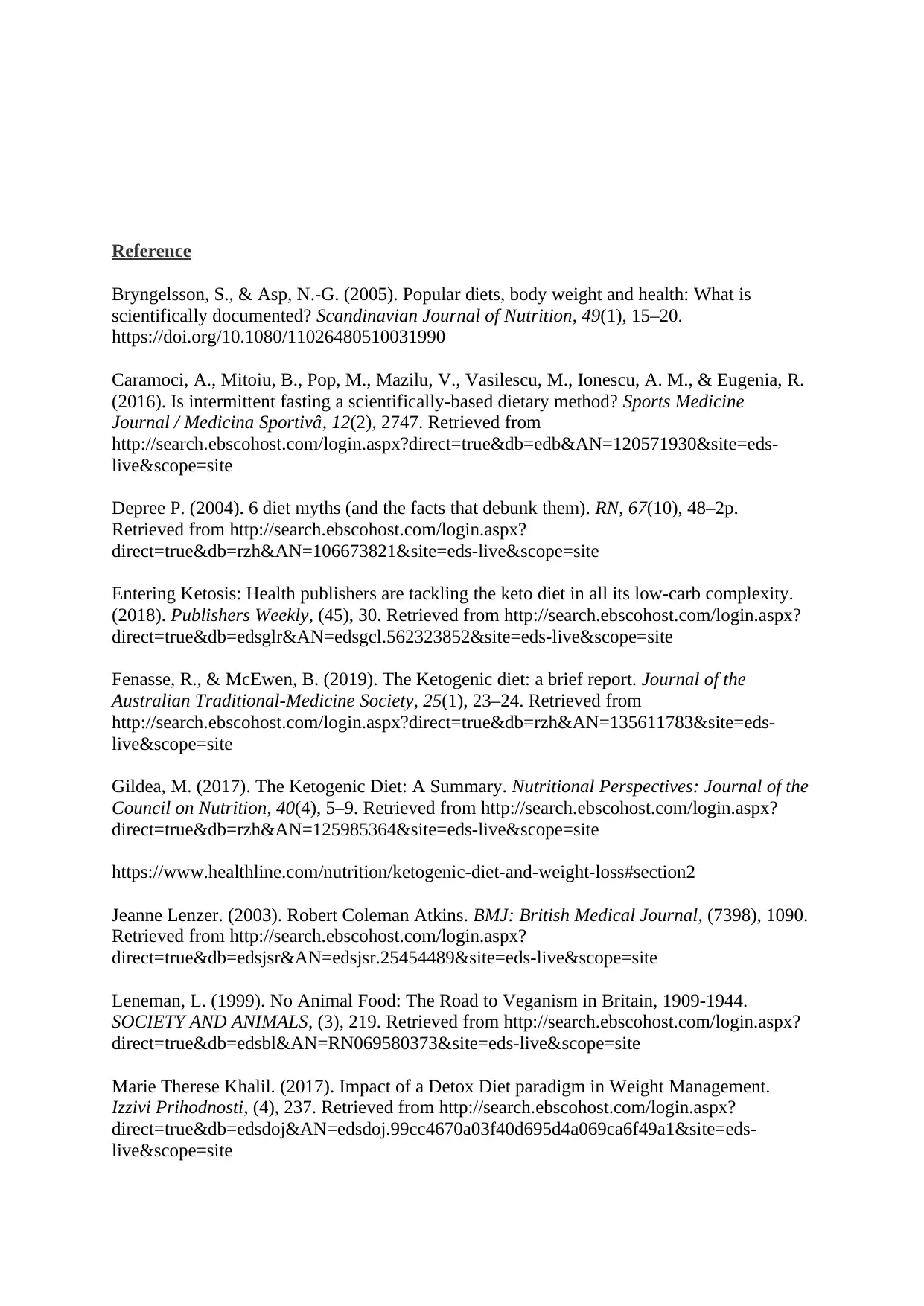
Reference
Bryngelsson, S., & Asp, N.-G. (2005). Popular diets, body weight and health: What is
scientifically documented? Scandinavian Journal of Nutrition, 49(1), 15–20.
https://doi.org/10.1080/11026480510031990
Caramoci, A., Mitoiu, B., Pop, M., Mazilu, V., Vasilescu, M., Ionescu, A. M., & Eugenia, R.
(2016). Is intermittent fasting a scientifically-based dietary method? Sports Medicine
Journal / Medicina Sportivâ, 12(2), 2747. Retrieved from
http://search.ebscohost.com/login.aspx?direct=true&db=edb&AN=120571930&site=eds-
live&scope=site
Depree P. (2004). 6 diet myths (and the facts that debunk them). RN, 67(10), 48–2p.
Retrieved from http://search.ebscohost.com/login.aspx?
direct=true&db=rzh&AN=106673821&site=eds-live&scope=site
Entering Ketosis: Health publishers are tackling the keto diet in all its low-carb complexity.
(2018). Publishers Weekly, (45), 30. Retrieved from http://search.ebscohost.com/login.aspx?
direct=true&db=edsglr&AN=edsgcl.562323852&site=eds-live&scope=site
Fenasse, R., & McEwen, B. (2019). The Ketogenic diet: a brief report. Journal of the
Australian Traditional-Medicine Society, 25(1), 23–24. Retrieved from
http://search.ebscohost.com/login.aspx?direct=true&db=rzh&AN=135611783&site=eds-
live&scope=site
Gildea, M. (2017). The Ketogenic Diet: A Summary. Nutritional Perspectives: Journal of the
Council on Nutrition, 40(4), 5–9. Retrieved from http://search.ebscohost.com/login.aspx?
direct=true&db=rzh&AN=125985364&site=eds-live&scope=site
https://www.healthline.com/nutrition/ketogenic-diet-and-weight-loss#section2
Jeanne Lenzer. (2003). Robert Coleman Atkins. BMJ: British Medical Journal, (7398), 1090.
Retrieved from http://search.ebscohost.com/login.aspx?
direct=true&db=edsjsr&AN=edsjsr.25454489&site=eds-live&scope=site
Leneman, L. (1999). No Animal Food: The Road to Veganism in Britain, 1909-1944.
SOCIETY AND ANIMALS, (3), 219. Retrieved from http://search.ebscohost.com/login.aspx?
direct=true&db=edsbl&AN=RN069580373&site=eds-live&scope=site
Marie Therese Khalil. (2017). Impact of a Detox Diet paradigm in Weight Management.
Izzivi Prihodnosti, (4), 237. Retrieved from http://search.ebscohost.com/login.aspx?
direct=true&db=edsdoj&AN=edsdoj.99cc4670a03f40d695d4a069ca6f49a1&site=eds-
live&scope=site
Bryngelsson, S., & Asp, N.-G. (2005). Popular diets, body weight and health: What is
scientifically documented? Scandinavian Journal of Nutrition, 49(1), 15–20.
https://doi.org/10.1080/11026480510031990
Caramoci, A., Mitoiu, B., Pop, M., Mazilu, V., Vasilescu, M., Ionescu, A. M., & Eugenia, R.
(2016). Is intermittent fasting a scientifically-based dietary method? Sports Medicine
Journal / Medicina Sportivâ, 12(2), 2747. Retrieved from
http://search.ebscohost.com/login.aspx?direct=true&db=edb&AN=120571930&site=eds-
live&scope=site
Depree P. (2004). 6 diet myths (and the facts that debunk them). RN, 67(10), 48–2p.
Retrieved from http://search.ebscohost.com/login.aspx?
direct=true&db=rzh&AN=106673821&site=eds-live&scope=site
Entering Ketosis: Health publishers are tackling the keto diet in all its low-carb complexity.
(2018). Publishers Weekly, (45), 30. Retrieved from http://search.ebscohost.com/login.aspx?
direct=true&db=edsglr&AN=edsgcl.562323852&site=eds-live&scope=site
Fenasse, R., & McEwen, B. (2019). The Ketogenic diet: a brief report. Journal of the
Australian Traditional-Medicine Society, 25(1), 23–24. Retrieved from
http://search.ebscohost.com/login.aspx?direct=true&db=rzh&AN=135611783&site=eds-
live&scope=site
Gildea, M. (2017). The Ketogenic Diet: A Summary. Nutritional Perspectives: Journal of the
Council on Nutrition, 40(4), 5–9. Retrieved from http://search.ebscohost.com/login.aspx?
direct=true&db=rzh&AN=125985364&site=eds-live&scope=site
https://www.healthline.com/nutrition/ketogenic-diet-and-weight-loss#section2
Jeanne Lenzer. (2003). Robert Coleman Atkins. BMJ: British Medical Journal, (7398), 1090.
Retrieved from http://search.ebscohost.com/login.aspx?
direct=true&db=edsjsr&AN=edsjsr.25454489&site=eds-live&scope=site
Leneman, L. (1999). No Animal Food: The Road to Veganism in Britain, 1909-1944.
SOCIETY AND ANIMALS, (3), 219. Retrieved from http://search.ebscohost.com/login.aspx?
direct=true&db=edsbl&AN=RN069580373&site=eds-live&scope=site
Marie Therese Khalil. (2017). Impact of a Detox Diet paradigm in Weight Management.
Izzivi Prihodnosti, (4), 237. Retrieved from http://search.ebscohost.com/login.aspx?
direct=true&db=edsdoj&AN=edsdoj.99cc4670a03f40d695d4a069ca6f49a1&site=eds-
live&scope=site
⊘ This is a preview!⊘
Do you want full access?
Subscribe today to unlock all pages.

Trusted by 1+ million students worldwide
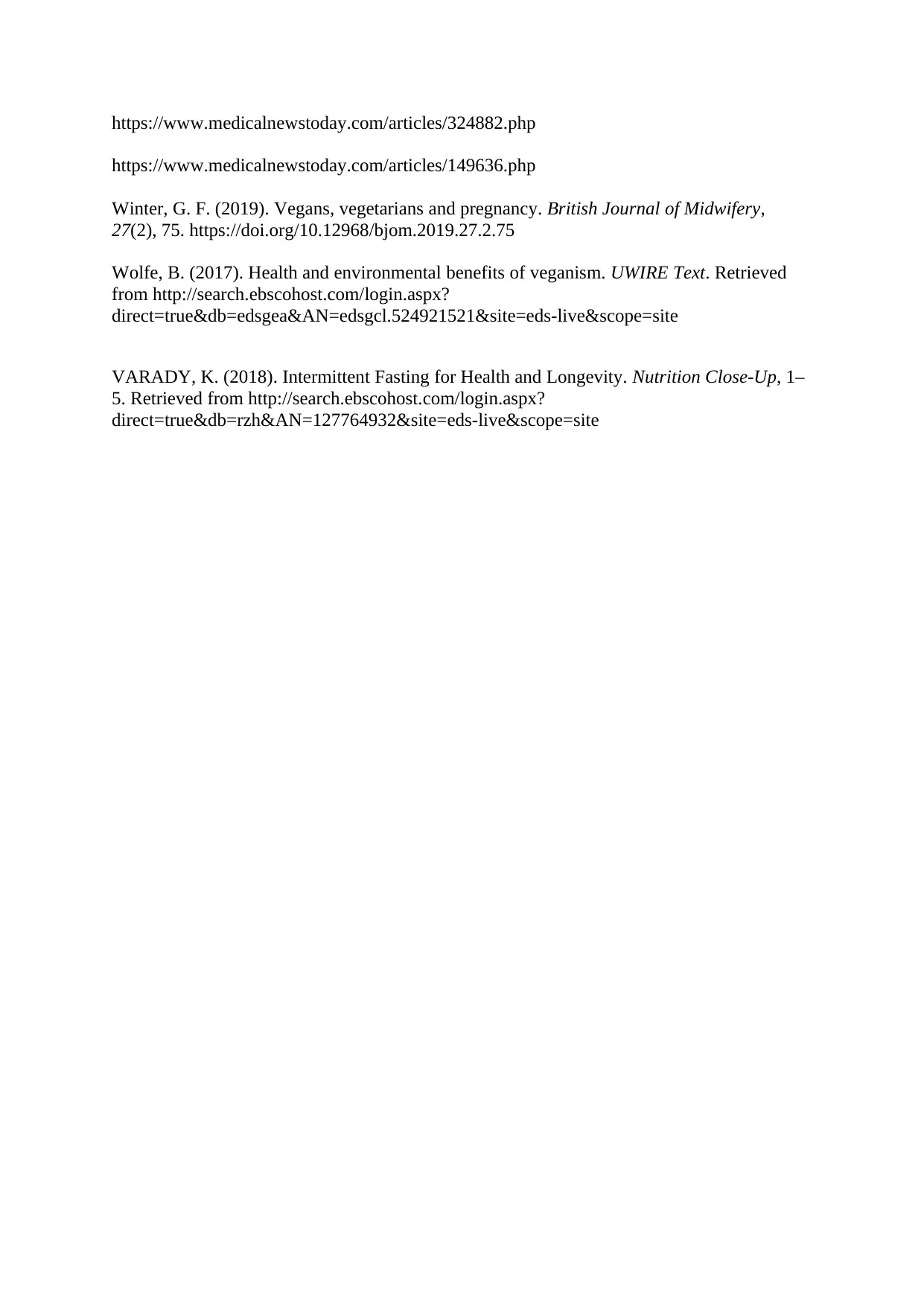
https://www.medicalnewstoday.com/articles/324882.php
https://www.medicalnewstoday.com/articles/149636.php
Winter, G. F. (2019). Vegans, vegetarians and pregnancy. British Journal of Midwifery,
27(2), 75. https://doi.org/10.12968/bjom.2019.27.2.75
Wolfe, B. (2017). Health and environmental benefits of veganism. UWIRE Text. Retrieved
from http://search.ebscohost.com/login.aspx?
direct=true&db=edsgea&AN=edsgcl.524921521&site=eds-live&scope=site
VARADY, K. (2018). Intermittent Fasting for Health and Longevity. Nutrition Close-Up, 1–
5. Retrieved from http://search.ebscohost.com/login.aspx?
direct=true&db=rzh&AN=127764932&site=eds-live&scope=site
https://www.medicalnewstoday.com/articles/149636.php
Winter, G. F. (2019). Vegans, vegetarians and pregnancy. British Journal of Midwifery,
27(2), 75. https://doi.org/10.12968/bjom.2019.27.2.75
Wolfe, B. (2017). Health and environmental benefits of veganism. UWIRE Text. Retrieved
from http://search.ebscohost.com/login.aspx?
direct=true&db=edsgea&AN=edsgcl.524921521&site=eds-live&scope=site
VARADY, K. (2018). Intermittent Fasting for Health and Longevity. Nutrition Close-Up, 1–
5. Retrieved from http://search.ebscohost.com/login.aspx?
direct=true&db=rzh&AN=127764932&site=eds-live&scope=site
1 out of 10
Related Documents
Your All-in-One AI-Powered Toolkit for Academic Success.
+13062052269
info@desklib.com
Available 24*7 on WhatsApp / Email
![[object Object]](/_next/static/media/star-bottom.7253800d.svg)
Unlock your academic potential
Copyright © 2020–2026 A2Z Services. All Rights Reserved. Developed and managed by ZUCOL.





